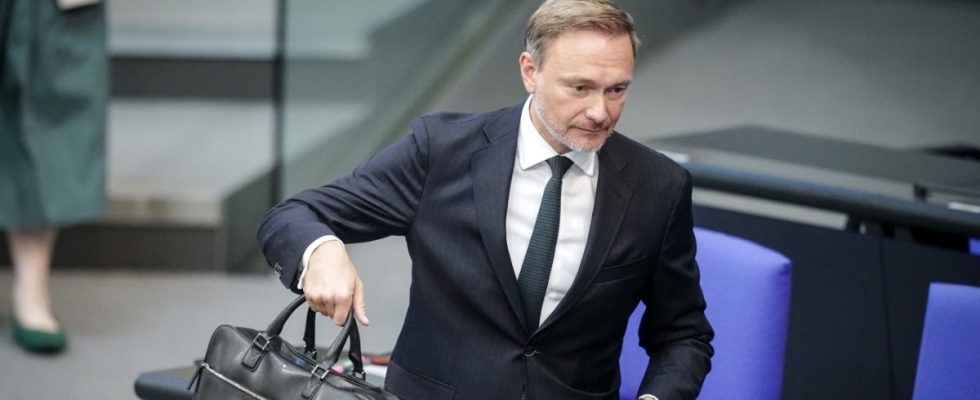Finance Minister Christian Lindner defends the return of the traffic light coalition to the debt brake from 2024 onwards. After years of special expenses caused by the crisis, Lindner said they now want to consolidate the budget. “Anyone who doesn’t manage to get out of the crisis endangers the stability of the country.” At the opening of the budget week in the Bundestag, he presented his draft of 445.7 billion euros – that is around 30 billion less than in the previous year, but also 60 billion more than the medium-term financial planning for 2020 had planned.
In previous years, there had been a lot of crisis-related expenses due to the corona pandemic, the energy crisis and the Ukraine war. That was important, emphasized Lindner. From now on, however, they want to significantly reduce new debt – from 45.6 billion euros for the current year to 16.6 billion euros for 2024.
Lindner does not want to accept the accusation that the return to the debt brake would “ruthlessly save” the country. With reference to the volume of the budget, he said: “There can be no question of a clear cut”. Total spending is still around a quarter above the level of 2019. After years of “massive state intervention” there must be a reasonable balance between state and private spending again.
Lindner is aware of criticism from the opposition, business and social organizations, but not everything can be financed “as one would wish”. He said: “The first priority is to fight inflation.” There is no way around it if you want to promote social and ecological projects.
The draft budget for 2024 is highly controversial – not only in the opposition. There are many lines of conflict between the traffic light coalition partners, which can also be seen in the reactions to the unfinished draft: Householders from the Greens have announced that they will still be looking for scope for social issues in the plan. However, there is not a lot of space for this – expenditure for social affairs, personnel as well as interest and repayment costs alone make up two thirds of the household.
Nevertheless, one accusation from the party is that Lindner always finds ways to finance tax relief, but that significantly less money is available for green projects such as basic child security. Family Minister Lisa Paus (Greens) had initially estimated between seven and twelve billion euros per year, last week she agreed with Lindner after a long dispute on 2.4 billion euros by 2025.
There is also criticism of the debt-financed funds
But Lindner’s own party still sees room for improvement in the draft. FDP housekeeper Otto Fricke announced that he would take a close look at the increase in citizen income.
Equally controversial are two shadow budgets with which the federal government makes investments: the Climate and Transformation Fund (KTF) and the Economic Stabilization Fund (WSF). Both pots are debt-financed and, at 400 billion euros, are about as heavy as the regular federal budget. Criticism of this also comes from the Federal Court of Auditors. The federal government, so the accusation, is thus concealing the actual debt.
The Union joins the Federal Court of Auditors in this matter. The real new borrowing is five times higher than indicated in the draft budget. “That’s just too much,” criticized the chairman of the budget committee of the Bundestag, Helge Braun. “Christian Lindner always says the right words about the debt brake, but doesn’t live it”

